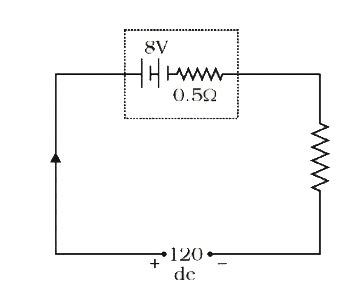A storage battery of emf 8.0 V and internal resistance 0.5Ω is being charged by a 120V dc supply using a series resistor of 15.5Ω. what in the terminal voltage of the battery during charging ? What is the purpose of having a series resistor in the charging circuit?
Emf of the storage battery, E=8.0V
Internal resistance of the battery, r−0.5Ω
DC supply voltage, V=120V
Resistance of the resistor, R=15.5Ω
Effective voltage in the circuit =V1
R is connected to the storage battery in series. Hence, it can be written as
V1=V−E
V1=120−8=112V
Current flowing in the circuit =I, which is given by the relation,
I=V1R+r
=11215.5+5=11216=7A
Voltage across resistor R given by the product, IR−7×15.5=108.5V
DC supply voltage = Terminal voltage of battery + Voltage drop acorss R
Terminal voltage of battery =120−108.5=11.5V
A series resistor in a charging circuit limits the current drawn from the external source. The current will be extremely high in its absence. This is very dangerous.
Similar Questions
A storage battery of emf 8.0 V and internal resistance 0.5 Ω is being charged by a 120 Ω d.c. supply using a series resistor of 15.5 Ω . What is the terminal voltage of the battery during charging ? What is the purpose of having a series resistor in the charging circuit ?
View SolutionA storage battery of emf 8V and internal resistance is being charged by a 120 V D.C. supply using a series resistor of What is the terminal voltage of the battery during charging? What is the purpose of having a series resistor in the charging circuit?

View Solution
Knowledge Check
A battery of emf 8 V with internal resistance 0.5Ω is being charged by a 120 V dc supply using a series resistance of 15.5Ω. The terminal voltage of the battery is
A20.5 VB15.5 VC11.5 VD2.5 VA battery of EMF 10 V, with internal resistance 1Ω is being charged by a 120 V d.c. supply using a series resistance of 10Ω. The terminal voltage of the battery is
A20 VB10 VCZeroD30 V
A storage battery of emf 8V and internal resistance is being charged by a 120 V D.C. supply using a series resistor of What is the terminal voltage of the battery during charging? What is the purpose of having a series resistor in the charging circuit?

View SolutionA storage battery is of emf 8V and internal resistance 0.5 ohm is being charged by d.c supply of 120 V using a resistor of 15.5 ohm
a) Draw the circuit diagram.
b) Calculate the potential difference across the battery.
c) What is the purpose of having series resistance in this circuit?
View SolutionA cell of emf 4V and internal resistance 1Ω is being charged by DC source of 10V through resistor of 5Ω .Calculate the terminal voltage across the cell -
View Solution(i) A storage battery of emf 8V, internal resistance 1Ω is being charged by a 120V d.c. source using a 15Ω resistor in series in the circuit. Calculate the current in the circuit (ii) terminal voltage across the battery during charging and (ii) chemical energy stored in the battery in 5 minutes.
View SolutionA battery of emf 2.0V and internal resistance 0.10Ω is being charged with a current of 5.0A. Find the potential difference between the terminals of the battery?
View SolutionA car battery of emf 12 V and internal resistance 0.1 Ω is being charged at a constant current of 5 A. The potential difference between the two terminals of the battery is ______.
View Solution
